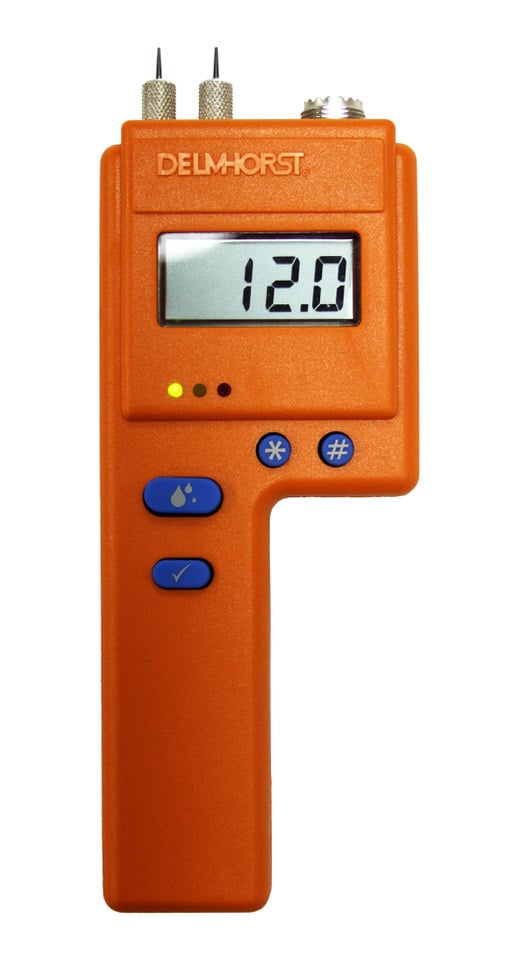The Ultimate Guide to Moisture Meters: A Comprehensive Review and Exactly How They Can Conserve You Money
Dampness meters serve as important devices in identifying and monitoring moisture content in materials, assisting in preventing pricey problems and making certain the high quality of products. Understanding the subtleties of different kinds of dampness meters, their applications, and the potential cost-saving advantages they use can be a game-changer for experts and organizations alike.
Sorts Of Dampness Meters
One common type is the pin-type moisture meter, which measures the electrical resistance in between 2 pins inserted into a product. Pinless dampness meters, on the other hand, use electro-magnetic sensing unit plates to scan a larger area without creating damage to the material's surface.

Infrared dampness meters gauge the thermal buildings of a material to identify its dampness material non-invasively, making them useful for applications where pin or pinless meters might not be ideal. Comprehending the various types of wetness meters offered can assist industries choose the most proper device for their particular dampness dimension needs.

Advantages of Making Use Of Wetness Meters
Wetness meters offer indispensable advantages in precisely monitoring and analyzing wetness levels in varied products and environments. One of the primary advantages of using moisture meters is the prevention of possible damages caused by excess dampness.
Moreover, utilizing wetness meters can lead to increased energy effectiveness. In agricultural setups, wetness meters play a crucial function in maximizing crop returns by making it possible for farmers to keep an eye on dirt moisture levels and make educated watering choices.
Just How to Choose the Right Moisture Meter
Selecting the appropriate dampness meter involves taking into consideration essential aspects such as product compatibility, measurement array, and calibration precision. When choosing a dampness meter, it's necessary to make sure that the meter appropriates for the details material you will be screening. Different materials have varying electrical residential or commercial properties that can affect wetness analyses, so picking a meter created for your material is important for exact outcomes. In addition, take into consideration the dimension variety of the dampness meter. Guarantee that the meter can discover dampness degrees within the array required for your applications. Calibration precision is an additional important variable to bear in mind. Go with a dampness meter with trustworthy calibration to make sure exact and constant analyses. Some meters might require periodic calibration changes, so recognizing the calibration process is very important. By thoroughly reviewing these factors, you can select navigate here a moisture meter that fulfills your needs and offers precise dampness dimensions for your projects.
Correct Strategies for Wetness Meter Use

Expense Savings Through Dampness Meter Applications
Exactly how can the calculated application of wetness meters result in significant cost savings across different sectors? Wetness meters play a critical function in expense savings by stopping possible damage and guaranteeing quality assurance in various industries. In the agriculture sector, wetness meters help in identifying the optimum time for collecting crops, preventing excess or over-drying wetness that can influence the end product's top quality. This precise monitoring assists farmers prevent unnecessary losses and optimize their yield.
Likewise, in building, dampness meters assist stop expensive damages by spotting dampness levels in building materials, such as wood or concrete, which can bring about structural concerns if not attended to without delay. By determining trouble areas at an early stage, contractors can take rehabilitative steps to stay clear of substantial repair work or replacements, inevitably saving time and cash.
In addition, in the food processing industry, moisture meters are necessary for monitoring item quality and ensuring conformity with safety and security policies. By precisely gauging wetness web content in food items, manufacturers can avoid perishing, preserve quality, and decrease waste, causing considerable cost financial savings. On the whole, the critical application of dampness meters is a beneficial investment that can lead to significant price decreases and boosted performance throughout different sectors.
Verdict
To more helpful hints conclude, wetness meters are useful devices for detecting and gauging dampness levels link in numerous materials. By making use of the right moisture meter and following appropriate methods, users can properly prevent costly damages brought on by excess wetness. Purchasing a high quality dampness meter can lead to significant expense financial savings in the long run by identifying possible issues early and making it possible for timely removal. Ultimately, dampness meters are vital instruments for keeping the stability and longevity of materials and frameworks.
Dampness meters serve as vital tools in spotting and keeping track of moisture material in products, helping in protecting against costly damages and ensuring the top quality of items. Infrared wetness meters gauge the thermal residential properties of a material to determine its wetness material non-invasively, making them valuable for applications where pin or pinless meters may not be suitable.Dampness meters use very useful benefits in accurately checking and analyzing dampness degrees in diverse products and atmospheres. In farming setups, wetness meters play an important role in optimizing crop yields by making it possible for farmers to keep an eye on dirt moisture levels and make educated watering choices.In conclusion, dampness meters are beneficial devices for gauging and discovering moisture degrees in numerous materials.